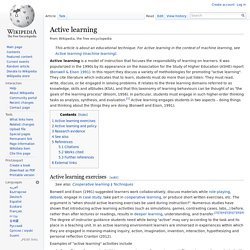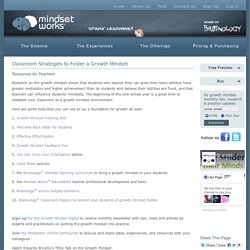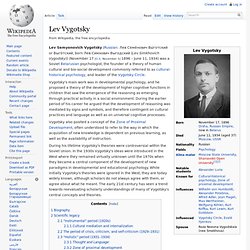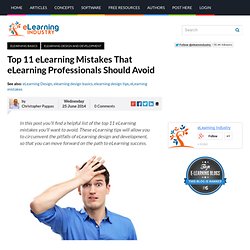

Active learning. Active learning is a model of instruction that focuses the responsibility of learning on learners.

It was popularized in the 1990s by its appearance on the Association for the Study of Higher Education (ASHE) report (Bonwell & Eison 1991). In this report they discuss a variety of methodologies for promoting "active learning". They cite literature which indicates that to learn, students must do more than just listen: They must read, write, discuss, or be engaged in solving problems. It relates to the three learning domains referred to as knowledge, skills and attitudes (KSA), and that this taxonomy of learning behaviours can be thought of as "the goals of the learning process" (Bloom, 1956). In particular, students must engage in such higher-order thinking tasks as analysis, synthesis, and evaluation.[1] Active learning engages students in two aspects – doing things and thinking about the things they are doing (Bonwell and Eison, 1991).
Active learning exercises[edit] See also[edit] Angela Lee Duckworth: The key to success? Grit. Mindset Works®: Student Motivation through a Growth Mindset, by Carol Dweck, Ph.D. Research on the growth mindset shows that students who believe they can grow their basic abilities have greater motivation and higher achievement than do students who believe their abilities are fixed, and that teachers can influence students’ mindsets.

The beginning of the new school year is a great time to establish your classroom as a growth mindset environment. Here are some tools that you can use to lay a foundation for growth all year: 1. Growth Mindset Framing Tool 2. 3. 4. 5. 6. 7. the Brainology® blended learning curriculum to bring a growth mindset to your students. 8. the Mindset Works® EducatorKit teacher professional development and tools. 9. 10. Sign up for the Growth Mindset Digest to receive monthly newsletter with tips, news and articles by experts and practitioners on putting the growth mindset into practice. And finally, check out this video about all the additional resources we offer to help educators and students build a growth mindset:
The Voice of the Active Learner. Education as it should be – passion-based. Lev Vygotsky. Lev Semyonovich Vygotsky (Russian: Лев Семёнович Вы́готский or Выго́тский, born Лев Симхович Выгодский (Lev Simkhovich Vygodsky)) (November 17 [O.S.

November 5] 1896 – June 11, 1934) was a Soviet Belarusian psychologist, the founder of a theory of human cultural and bio-social development commonly referred to as cultural-historical psychology, and leader of the Vygotsky Circle. Vygotsky's main work was in developmental psychology, and he proposed a theory of the development of higher cognitive functions in children that saw the emergence of the reasoning as emerging through practical activity in a social environment. During the earlier period of his career he argued that the development of reasoning was mediated by signs and symbols, and therefore contingent on cultural practices and language as well as on universal cognitive processes. During his lifetime Vygotsky's theories were controversial within the Soviet Union. Biography[edit] Scientific legacy[edit] Www.cles.mlc.edu.tw/~cerntcu/099-curriculum/Edu_Psy/EP_03_New.pdf. Key Steps to becoming a Successful Learner.
Top 11 eLearning Mistakes That eLearning Professionals Should Avoid. In this post you'll find a helpful list of the top 11 eLearning mistakes you'll want to avoid.

These eLearning tips will allow you to circumvent the pitfalls of eLearning design and development, so that you can move forward on the path to eLearning success. There are so many things to consider when you're developing an eLearning course. From worrying about the core content and developing an effective eLearning strategy to ensuring that the design is in-line with your organization's brand and message, even the most simple and straightforward eLearning project can become overwhelming. As such, there's plenty of room to make mistakes along the way, whether this is your first eLearning project or your hundredth. Losing sight of the learning goalsThe learning goals should always be in the forefront of your mind. Also, you are welcome to check the 10 Common Mistakes In The Development Of An eLearning Course for additional information.